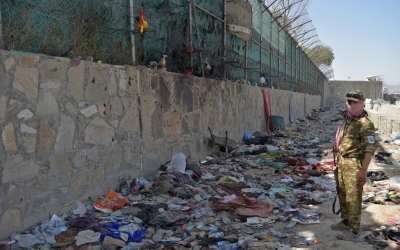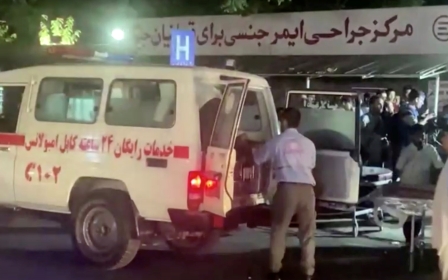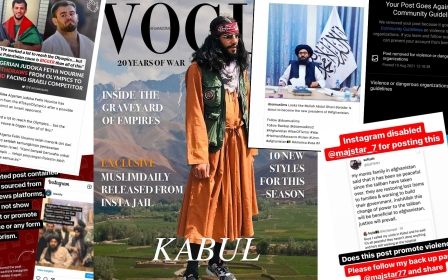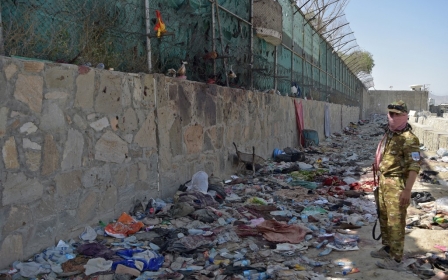Kabul airport attack: Fear of copycats across Middle East in the wake of IS assault
The horror and success of Islamic State’s attack on Kabul airport on Thursday has raised fears of copycat attacks from the group’s affiliates - and its competitors - across the Middle East.
“The war is yet to come. This whole withdrawal announcement and process has been an enormous morale boost for Islamic radicals everywhere,” Ryan Crocker, former US ambassador to Afghanistan, said hours after the explosion.
'What happens in Afghanistan doesn’t stay in Afghanistan'
- Ryan Crocker, former US ambassador to Afghanistan
“Al-Qaeda, Islamic State, Pakistani Taliban. You name it. They are on a roll and they know it. What happens in Afghanistan doesn’t stay in Afghanistan. We’ve seen that before.”
The intentions of IS-K - Islamic State’s Afghan affiliate - to attack in the country was clear - so clear that US officials warned repeatedly and explicitly that the group was likely to strike the airport.
The killing of 13 US service members will be useful propaganda for IS - a group that celebrates failed attacks - to inspire and recruit followers and further attacks, say analysts.
New MEE newsletter: Jerusalem Dispatch
Sign up to get the latest insights and analysis on Israel-Palestine, alongside Turkey Unpacked and other MEE newsletters
But the question is whether its supporters and affiliates - in Iraq, Syria, Yemen, Libya, the Sinai, the Sahel and West Africa - have the capability and materials to do so.
“It’s pretty clear to me that Daesh was looking - and will continue to look - for opportunities to put its money where its mouth is,” said Tobias Borck, a research fellow for Middle East security studies at Royal United Services Institute in London.
“Whether they are going to be successful in that is a completely different question.”

In Syria and Yemen, he said, the space for IS activity seems pretty narrow at the moment while in Iraq and Libya, IS has demonstrated some capability in recent months. The biggest area of concern, however, is West Africa and the Sahel.
But the capability of the affiliates can be difficult to assess because it often comes down to the skills and materials available to small groups of individuals, he said.
“So in a way, right now could really be seen a little bit like some sort of space where we can see just how much Daesh really still has in terms of capability.”
In other words, a wait and see. Meanwhile, groups like al-Qaeda, an enemy of IS, may feel pressure to demonstrate that it is still relevant, Borck said.
“The jihadi space is one where organisations vie for ultimately a fairly small consituency if you will, and therefore have to show what they’ve got,” he said.
Perpetual war on terror
As the consequences of the US pullout continue to unfold, many noted on Friday, like Crocker, that it is now clear that the “forever war” is far from over.
"In the past 20 years, the number of terrorists has increased hundreds, perhaps thousands of times over," tweeted David Rothkopf, the host of the political podcast, Deep State Radio.
'[Thursday's] bombings were attributed to ISIS-K, a spin off of an al-Qaeda spin-off that started someplace else. The horse is out of the barn folks'
- David Rothkopf, Deep State Radio
"Al-Qaeda is now a global network located across the Middle East, Africa and Asia. And for further proof, you need only note that yesterday's bombings were attributed to ISIS-K, a spin-off of an al-Qaeda spin-off that started someplace else. The horse is out of the barn folks.
“We invaded Afghanistan to fight a terrorist group, al-Qaeda, that attacked us," noted commentator Mehdi Hasan. "As we leave, we’re attacked by another terrorist group, ISIS, worse than al-Qaeda and which didn’t exist when we invaded.
“All the war on terror gave us was more war and more terror.”
Middle East Eye delivers independent and unrivalled coverage and analysis of the Middle East, North Africa and beyond. To learn more about republishing this content and the associated fees, please fill out this form. More about MEE can be found here.




